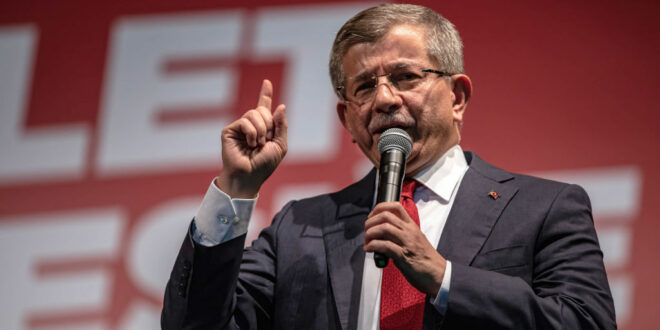Turkey’s Syria policy didn’t materialize in a vacuum. Rather, it was a reaction to the Arab uprisings that began in January 2011, known as the Arab Spring, which Turkish policymakers interpreted as a providential opportunity.
The fall of entrenched dictators (in Tunisia, Libya, Egypt, Yemen and, eventually, Syria) would, the Turks believed, open the door for Ankara to assume leadership of the broader Muslim world. No Turkish official bought into this vision more fervently than Ahmet Davutoğlu, the intellectual architect of what would become Turkey’s neo-Ottoman moment.
Davutoğlu served as Erdoğan’s chief foreign policy advisor from 2003 to 2009 and as foreign minister from 2009 to 2014. Known among party elites as “the professor,” Davutoğlu was the ideological theorist of Turkey’s regional ambitions. He distinguished himself from his peers in Milli Görüş (the “National View” Turkish Islamist movement) by having serious academic credentials from one of Turkey’s top universities, Boğaziçi (formerly Robert College).
Davutoğlu’s 2001 book, Strategic Depth: Turkey’s International Position, lays out the thesis that Turkey is uniquely suited, by virtue of its historical, political, and cultural ties, to lead the Muslim world in the 21st century. He prophesizes: “A new Middle East is about to be born. We will be the owner, pioneer and the servant of this new Middle East.”
Davutoğlu’s thesis leans heavily into a grievance narrative familiar to many Muslim intellectuals – lamenting Western imperialism and the colonial carve-up of the Ottoman Empire. For Davutoğlu, the post-World War I order in the Middle East was a historical aberration, a “parenthesis” that must be closed with Turkey’s resurgence as a political and economic force. Within this Turkish Islamist worldview, the secular authoritarian regimes across the Arab world were illegitimate, brittle holdovers from a Western-imposed system destined for collapse.
Strategic Depth reads as a manifesto of Turkish exceptionalism: Muslims, weary of post-colonial stagnation, long for the return of Turkish leadership. Davutoğlu’s confidence was bolstered, ironically, by Western praise. The Obama administration in 2009 dubbed Turkey a “model country,” citing its secular institutions and robust economic performance under Erdoğan and his Justice and Development Party (AKP is its Turkish acronym).
But just as Obama was praising the Turkish model, Erdoğan and the AKP were moving off the country’s democratic path and beginning to dismantle the secular foundations of the republic.
In partnership with the Gülen movement – another Turkish Islamist actor with adherents throughout the security establishment – the AKP moved to delegitimize Turkish secular elites and reengineer state institutions. In 2014, the method of appointing judges was changed to give the ruling party a majority vote. Judges soon began prosecuting secular journalists and military leaders. Legislative efforts flirted with criminalizing adultery and banning abortion. At the same time, education policy shifted dramatically: religious schools were favored, math and science curricula were diluted, and admissions preferences were extended to students from conservative religious backgrounds.
This domestic transformation paralleled an equally ambitious foreign policy shift. As Arab regimes fell one by one beginning in spring 2011, Turkey wasted little time in backing Sunni Islamist movements, particularly those affiliated with the Muslim Brotherhood. Egypt became the prime example. After the fall of Hosni Mubarak, Turkish President Abdullah Gül was the first foreign leader to visit Mohamed Morsi, the Brotherhood-backed candidate. Ankara provided Cairo with $2 billion in aid and even dispatched professional campaign advisors to help Morsi win the presidential elections of 2012.
In Libya, following Muammar Qaddafi’s ouster in 2011, Ankara extended a $300 million credit line to the Transitional National Council, facilitating the emergence of the Brotherhood-linked Justice and Construction Party. After Libya descended into civil war, Turkey backed several Islamist factions, culminating in their capture of Tripoli and the eventual formation of the internationally recognized government.
Even in countries where Turkey didn’t directly facilitate political transition, its ideological influence was clear. In Tunisia, for instance, Muslim Brotherhood-inspired leader Rachid Ghannouchi praised Erdoğan’s model, insisting that his movement should be likened to Turkey, not Iran.
By supporting these populist Islamist movements across the region, Erdoğan and Davutoğlu achieved two goals. Domestically, they cultivated their image as defenders of the international Muslim community, the ummah. Regionally, Erdoğan’s popularity surged. His outspoken support for Islamist causes earned him credibility on the Arab street.
This period also marked the unraveling of Turkey’s once-close ties with Israel. For decades, Ankara and Jerusalem had enjoyed strategic cooperation, particularly in trade, intelligence, and military affairs. Erdoğan was willing to torch that relationship, beginning with his now-famous confrontation with Israeli President Shimon Peres at the 2009 World Economic Forum, where he accused Israel of being a nation of “killers.” The outburst earned him applause at home and across the Muslim world, and paved the way for Turkey to become one of Hamas’ primary patrons, alongside Iran and Qatar.
Before the Arab Spring, Davutoğlu’s dream of Turkish leadership in the Muslim world was confined to academic theory. But the uprisings transformed his ideas into policy. As discussed in the first installment of this series, Erdoğan had initially invested significant diplomatic capital in improving ties with Bashar al-Asad. But once the uprisings spread to Syria, Davutoğlu and Erdoğan concluded that Asad’s fall was inevitable and they aligned Turkish policy accordingly.
Erdoğan’s timing was off in treating Syria’s regime as another domino that would fall like Egypt’s or Tunisia’s. But al-Asad had powerful patrons in Russia and Iran. The Syrian conflict began as an opportunity for Turkish ascendancy but is increasingly looking like a quagmire for Turkish aspirations.
 Eurasia Press & News
Eurasia Press & News




